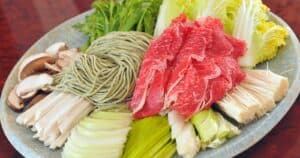Nothing ruins a hot pot night faster than realizing your precious soup base has gone bad. As you stare into your fridge at the containers of seasoning and broth you so carefully prepared, that sinking feeling hits. Has your soup base gone past its prime?
The good news is that hot pot soup bases can last quite a while when stored properly. Many premade soup base mixtures have expiration dates printed right on the packaging. For homemade broths and seasoned oils, general guidelines suggest they remain usable for around 4-6 months when kept refrigerated in airtight containers.
Pay attention for any changes in texture, smell, or appearance. Cloudiness, odd smells, mold growth, or separation are all signs your soup base has spoiled. If you notice your broth thickening over time, that is also an indicator it should be discarded and a new batch made.
When in doubt, remember the golden rule – if it smells funky, looks weird, or you wouldn’t want to consume it yourself, toss it! Don’t risk food poisoning or an off tasting hot pot. We’ll walk through specific expiration timelines and storage tips to keep your hot pot soup bases fresh and flavorful. Let’s dive in!
How Long Does Hot Pot Soup Base Last?
The shelf life of hot pot soup base depends on several elements:
Store-Bought Premade Soup Base
Many popular hot pot soup base mixes like Little Sheep or Haidilao include expiration or best by dates printed right on the package. This date indicates how long the soup base will maintain peak quality when stored properly unopened.
For example, a sealed packet of Haidilao mala soup base mix may have a shelf life of around 6-12 months from the production date.
Once opened, the countdown begins – use within a few months for best flavor.
Homemade Soup Broth
For homemade hot pot broth, general guidelines suggest:
- Refrigerated: 4-6 months
- Frozen: 6-12 months
Proper storage is key for maximum freshness (more on that later).
Seasoned Oils or Sauces
Oils and sauces added directly to hot pot like sesame oil, chile oil, or shacha sauce also have a 4-6 month shelf life from the date you open them.
Again, keep them sealed and refrigerated to optimize freshness.
Signs Your Hot Pot Soup Base Has Expired
Hot pot soup base doesn’t necessarily “go bad” overnight. Quality slowly degrades over time.
Watch for these red flags that indicate your soup base is past its prime:
- Appearance Changes: Cloudiness, layer separation, oil pooling on top
- Texture Changes: Thickening, chunks, gumminess, crystally precipitates
- Smell: Rancid, sour, or funky odors
- Taste: Significant flavor loss, flat, or off tastes
- Mold: Any fuzzy growth means toss immediately!
Trust your senses. If anything seems “off” from the soup base’s original state, it’s time to discard and make a fresh batch.
Proper Storage for Maximum Shelf Life
Optimizing how you store hot pot soup base is the #1 way to extend its shelf life. Follow these tips:
Store in Airtight Containers
Exposure to air starts the degradation process. Store opened soup base in airtight, non-reactive containers like glass jars or plastic deli containers. Ensure lids seal tightly.
Refrigerate Promptly After Opening/Preparing
Keep that soup base chilled at 40°F or below. Never leave broths or seasoned oils sitting out at room temperature. Refrigerate promptly after opening or preparing.
Freeze for Long-Term Storage
Freezing is great for long-term storage and preserving quality. Most soup bases freeze beautifully for 6-12 months. Leave at least 1 inch headspace in containers as liquids expand when frozen.
Avoid Repeated Freezer Thaws
Limit the freezer to just 1 or 2 thaw cycles. Repeated thawing and re-freezing degrades texture and concentrates spices in a negative way.
Use Clean Utensils and Containers
Always use clean spoons, ladles, and storage containers. Dirty utensils or containers can introduce bacteria and speed spoilage.
Following proper storage methods helps extend your precious soup base’s shelf life significantly!
Shelf Life for Common Hot Pot Soup Base Ingredients
Hot pot soup bases often contain various herbs, spices, aromatics, oils, and premade mixes. Here are some specific timelines for common ingredients:
Fresh aromatics (green onions, garlic, ginger, etc):
- Refrigerator: 1 week
- Freeze: 4-6 months
Dried spices and herbs:
- Pantry or cupboard: 2-3 years
- Refrigerator: 3-4 years
- Freeze: 4-5 years
Sesame oil:
- Refrigerated after opening: 4-6 months
Chile oils:
- Refrigerated after opening: 4-6 months
Soy sauce:
- Pantry after opening: 6-12 months
- Refrigerated after opening: 1 year
Cooking wine:
- Pantry after opening: 1 year
- Refrigerated after opening: 2 years
Premade soup base mixes:
- Shelf life unopened: Check package date, usually 6 months – 1 year
- Refrigerate after opening: 3-4 months
Homemade broths:
- Refrigerated: 4-6 months
- Frozen: 6-12 months
Vinegars:
- Pantry: Indefinite shelf life
- Refrigerated after opening: 2 years
As you can see, most soup base components have decently long shelf lives of several months to a year or greater. Controlling storage conditions helps optimize that longevity.
Can Expired Hot Pot Soup Base Make You Sick?
You may be wondering – what actually happens if I use an expired or spoiled soup base?
Consuming rancid, moldy, or bacteria-laden broth likely won’t kill you. But it does come with risks like:
- Food poisoning – symptoms may include nausea, vomiting, diarrhea, and abdominal cramps
- A bad tastes – ranging from slightly stale to absolutely disgusting
- Decreased nutrition – loss of nutrients, vitamins, antioxidants over time
Many folks have taste tested expired soup stocks that simply tasted “off” but caused no illness. However, food poisoning is still possible if dangerous bacteria multiplied, so it’s smart to play it safe and stick to fresh broth.
When to Toss Hot Pot Soup Base
As a general rule of thumb, be extra cautious and discard any soup base that:
- Has visible mold growth
- Smells rancid, sour, or odd
- Looks or feels abnormally thickened or separated
- Tastes noticeably stale, metallic, or sharp
Trust your senses. You’ll know an old broth when you smell or taste it!
Cloudiness alone doesn’t necessarily mean spoilage, but it’s a clue to use up the soup base soon. And remember oil separation is normal for certain broths after refrigeration due to the lipids coagulating when chilled.
Still unsure if your soup base is okay? Remember the old adage – when in doubt, throw it out! Starting fresh is better than risking an upset stomach.
Tips for Using Up Soup Base Before It Expires
Hate to waste a slightly older soup base that’s still usable? Try these tips:
- Make a hot pot dinner ASAP to use it up while it’s still decent.
- Simmer it a bit with fresh aromatics to freshen up the flavor.
- Freeze measured portions in ice cube trays for easy use in stir fries, noodles dishes, etc.
- Mix it into rice, chowders, or gravy recipes as an enhancer.
- Reduce excess diluted soup stock into a flavorful sauce or glaze.
- Pour it into a simmering pot of beans or lentils to add savory depth.
Creatively repurposing your old soup stock helps cut down on waste – but don’t hesitate to compost or discard if the quality just isn’t there anymore.
FAQs
FAQ 1: How can I tell if my premade hot pot soup base packet has expired?
Check the best by date printed on the package. If past this date, discard the mix even if sealed. After opening, use within a few months for best quality. Signs of spoilage in opened packets include color changes, clumping, odor, and loss of flavor.
FAQ 2: My homemade hot pot broth smells funny but doesn’t have mold. Is it still safe to use?
No. Any off odors mean unwanted bacteria could be growing in the broth. Do not take risks with spoiled soup base, even if no visible mold. When in doubt, throw it out and start fresh.
FAQ 3: Does separating or thickening mean my hot pot soup base is expired?
Not necessarily. Many hot pot soup bases separate into layers or thicken over time when refrigerated. This is normal. However, extreme thickening, clumping, gumminess, or crystal formation does indicate the broth is overly aged and should be discarded.
FAQ 4: How long does an opened bottle of sesame hot pot oil last in the fridge?
Around 4-6 months. Oils used for hot pot like toasted sesame have a shorter shelf life after opening compared to plain oil. Store them sealed in the fridge and use within 6 months at most. Rancid smells, visible separation, or cloudiness are signs to get a fresh bottle.
FAQ 5: Is it safe to freeze and re-freeze hot pot soup base multiple times?
No. Limit the soup base to 1 or 2 freeze-thaw cycles maximum. Repeated freezing and thawing degrades the quality and can lead to textural changes. For long term storage, portion out soup base into small containers to avoid multiple defrosts of the same batch.
The Bottom Line
Hopefully these tips give you peace of mind on determining if your precious hot pot soup base has expired or not.
Some key takeaways:
- Follow printed best by dates for premade mixes.
- Consume homemade broths within 4-6 months refrigerated or 6-12 months frozen.
- Discard soup bases at the first signs of spoilage like odor, texture, or appearance changes.
- Optimize storage conditions to maximize shelf life.
- Trust your senses – if it seems off, toss it out!
With proper storage and handling, you can enjoy your homemade or store-bought hot pot soup bases for many months to come. Get ready for some seriously satisfying spicy, full-flavored hot pot nights!





